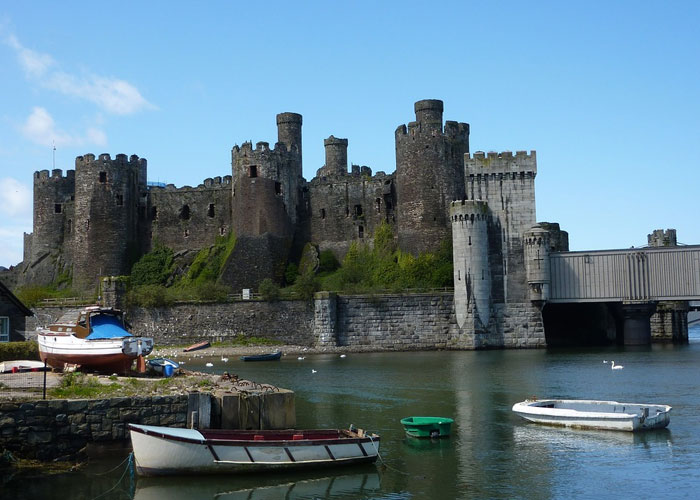New Research Crowns Conwy As The Best Town For Multi-generational Families in the UK

Conwy is a hotspot for tourists and residents alike – famous for scenic coastlines, deep rooted history and culture – and now new research from Lottie has crowned this coastal town the best place for multigenerational living, based on an analysis of the town’s population.
Intergenerational connections have a wealth of health and wellbeing benefits, and more people than ever before are becoming aware of the benefits of socialising with different generations – with a 33% surge in online searches for ‘intergenerational relationships’ over the last 12 months.
Lottie’s experts analysed the generational split across UK towns and cities to reveal the 7 most multigenerational towns and cities across the country: with Conwy being crowned in 1st place, Scarborough in close 2nd, and Chichester coming in 3rd place.
Here’s why Conwy is the best town for multigenerational families according to Lottie’s new research:
Will Donnelly, Care expert and Co-Founder at Lottie shares, “It’s not surprising our research has found Conwy to be the best location for intergenerational living.
Conwy offers the perfect balance of a vibrant coastal town, scenic outdoor spaces and a strong sense of community – making it the perfect location for everyone of all ages. Similarly, previous research has found Conwy amongst the happiest places to live in the UK – with strong life satisfaction and overall happiness levels.
Basing our insights on demographic results of the 2021 census, we’ve revealed the best places to live that bring a variety of generations together – all of which can boost your wellbeing and socialisation. Our research has found seaside towns or locations close to the coast appear in our top 7 multigenerational locations in the UK .
With an ageing population, many people across the country are living in intergenerational communities – and we’re even seeing up to 3 or 4 different generations in one family. There’s lots of benefits from intergenerational relationships including learning new skills, reducing feelings of loneliness, encouraging a sense of belonging and strong community ties.
Ageing is a natural part of life. However, sometimes as we age the way traditional towns and cities are designed can leave older generations feeling excluded from society. From easy access to buildings, affordable transport and socialising opportunities – all generations can benefit from a healthy, happy and age inclusive community.
Here’s what makes Conwy the best multigenerational location for families, according to Lottie’s new research:
Lottie’s research has revealed Conwy is the most intergenerational place to live in the UK, with an overall 50% even split of younger and older generations living in the area.
Not only does Conwy offer beautiful coastlines, outdoor adventures and historic culture, it is home to a world heritage site – Conwy Castle. Conwy has also been ranked one of the happiest places to live in the UK – with locals in the area reporting high life satisfaction and happiness scores.
Conwy offers a range of activities for all generations to enjoy, from coastal walks, history and watersports – there’s something for everyone to enjoy.
It’s no surprise Conwy has been revealed as the most intergenerational location in the UK – it scores well in many wellbeing factors crucial at all ages in life.
From a low crime rate – 41% below the UK national average, strong transport links to major UK cities (under 2 hours on the train from Manchester), and an affordable cost of living there are lots of perks living in Conwy for every generation.

Here’s how to make your community age friendly, according to Lottie’s Will Donnelly:
“Age friendly communities are places where age is not a barrier to living well – they often benefit from intergenerational connections, relationships and socialising”, shares Will Donnelly.
“With an ageing population many of us are living longer and this creates the opportunity to create vibrant communities – where we can all learn from each other, reduce the risk of isolation across all generations and improve the quality of life for all. From the government, councils, healthcare support to individuals in a community there are steps we can all take to create an age friendly community”.
- Respect for seniors
Although respect for older generations is shown in most communities, there are still some negative preconceptions when it comes to ageing – like the activities elderly people enjoy to the time they like to spend socialising.
Each of us are unique and have our own interests and hobbies – and this doesn’t change as we age. From intergenerational interactions, younger generations can learn to remove any misconceptions associated with ageing – whilst encouraging elders to continue their interest and hobbies sharing their knowledge and wisdom with younger generations.
- Social interaction and participation
The way many societies are built can make it hard to stay connected to others as you age – and this can increase your risk of loneliness, especially during the winter months.
Intergenerational socialisation can boost older generations’ self- esteem and keep them engaged with the community, helping both older and younger generations to feel valued in their community.
From age friendly activities, walking clubs and coffee mornings – there are lots of ways to bring everyone of all ages together.
- Accessible transport
Accessible and affordable public transport is key to ensuring all residents of a community are able to actively and remain engaged with their community. With a limited budget or reduced mobility as we age, it’s no surprise that a lack of accessible transport can be an issue for older generations.
Whilst transportation may seem like an issue for the local council to tackle as a member of your community you can make small steps to help those older than you to access transport safely. From giving up your seat on the bus or train for someone who may need it more, or offering support to carry heavy shopping bags – there are small acts of kindness that can make someone’s day much easier.
- Health services
With an ageing population it’s important for healthcare services to consider how they can best support the health of older generations and the ease of access to their services.
The elderly care sector provides much needed help and support for families and their loved ones – from residential and nursing care to respite support there’s lots of support available. However, with the cost of living and energy crisis – the care sector is in need of urgent support and funding from the government to continue supporting those most vulnerable in society.
- Communication and technology support
Staying connected to news, events and activities is a key part of staying healthy as we age.
Technology can be tapped into to help older generations to stay connected from using a smartphone to stay in touch or video call a loved one to staying on top of news or activities in your local area.
You can support an elderly loved one to stay connected by helping them to use and understand modern technology. Whilst businesses can consider how they can best distribute their information so it is easily accessible to customers of all ages.





